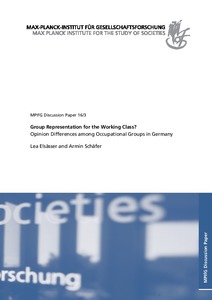Group representation for the working class? Opinion differences among occupational groups in Germany
"In this paper, we take up the burgeoning debate about the underrepresentation of the working class in politics. In the literature section we discuss theories of group representation and look at recent empirical studies of responsiveness that have begun to disaggregate public opinion by sociode...
| Main Authors: | , |
|---|---|
| Institution: | ETUI-European Trade Union Institute |
| Format: | TEXT |
| Language: | English |
| Published: |
Köln
2016
MPIfG |
| Subjects: | |
| Online Access: | https://www.labourline.org/KENTIKA-19105277124919234599-Group-representation-for-the-w.htm |
| Summary: | "In this paper, we take up the burgeoning debate about the underrepresentation of the working class in politics. In the literature section we discuss theories of group representation and look at recent empirical studies of responsiveness that have begun to disaggregate public opinion by sociodemographic categories. Empirically, we analyze a dataset of more than 700 survey items collected in Germany between 1980 and 2012. The analysis shows that respondents within one social class are more similar to each other than to members of other classes and that class-based differences outweigh those of education, region, or gender. While opinion differences are not always large, they can reach 50 percentage points. There are frequently gaps of between 20 or 30 percentage points in support for or opposition to policy changes. Since workers’ opinions tend to differ from the opinions of those groups who are well represented in parliament, their numerical underrepresentation might bias decisions against them, as recent studies suggest." |
|---|---|
| Physical Description: | 17 p. Digital |

